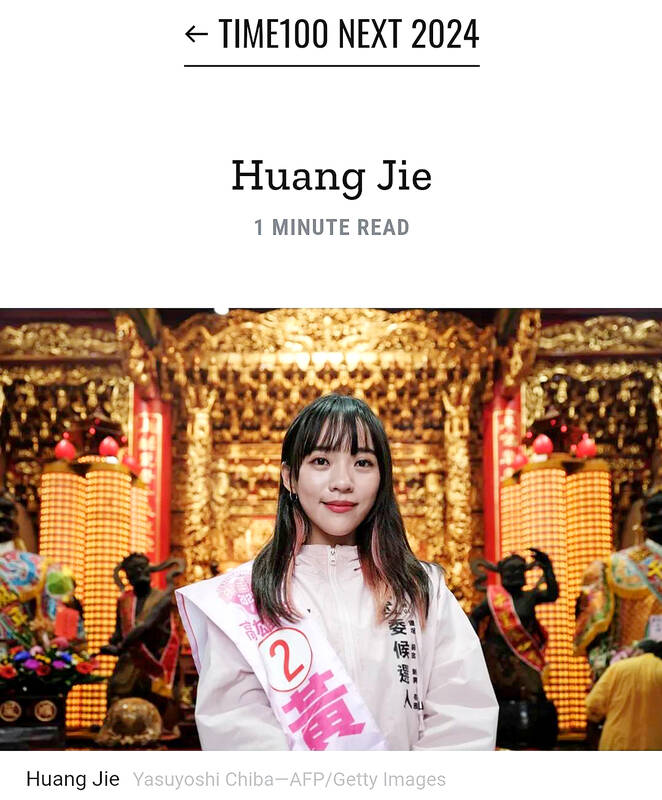Democratic Progressive Party (DPP) Legislator Huang Jie (黃捷) has landed a spot on Time magazine’s annual “100 Next” list which honors 100 emerging leaders around the world.
The US magazine revealed its 2024 TIME100 Next list on Wednesday, featuring many LGBTQ+ stars which it said are shaping the future and defining the next generation of leadership.
Huang, 31, was described in an introduction written by Vice President Hsiao Bi-khim (蕭美琴) as the youngest member of the legislature and a member of the LGBTQ+ community who has speaks out for underrepresented groups.

Photo: Screen grab from Time’s Web site
“Having begun her political career in the Kaohsiung City Council, she has gone on to work on a diverse range of issues, including gender equality, transportation infrastructure, parliamentary diplomacy, and international human rights advocacy,” Hsiao wrote in the article.
“Passionate about human rights and the advancement of public good, she exemplifies the spirit of civic participation among Taiwan’s younger generation,” Hsiao said.
“Her efforts to engage voters and energetic calls for action signify that democracy has become a part of daily life in Taiwan — it’s as natural as the air we breathe,” Hsiao added.
Time published its first 100 rising stars list in 2019 and it has been published annually since then.
It recognizes young leaders in the categories of Artists, Phenoms, Advocates, Leaders and Innovators.
Taipei Mayor Chiang Wan-an (蔣萬安) of the Chinese Nationalist Party (KMT) featured on last year’s list.
Former KMT chairman Johnny Chiang (江啟臣) appeared in 2021.
Enoch Wu (吳怡農), the founder of Forward Alliance, a Taiwanese non-governmental organization, and a former DPP legislative candidate, was in the 2022 version.
The magazine has scheduled an event in New York on Oct. 9, where the TIME100 Next honorees would gather.

Hong Kong-based American singer-songwriter Khalil Fong (方大同) has passed away at the age of 41, Fong’s record label confirmed yesterday. “With unwavering optimism in the face of a relentless illness for five years, Khalil Fong gently and gracefully bid farewell to this world on the morning of February 21, 2025, stepping into the next realm of existence to carry forward his purpose and dreams,” Fu Music wrote on the company’s official Facebook page. “The music and graphic novels he gifted to the world remain an eternal testament to his luminous spirit, a timeless treasure for generations to come,” it said. Although Fong’s

China’s military buildup in the southern portion of the first island chain poses a serious threat to Taiwan’s liquefied natural gas (LNG) supply, a defense analyst warned. Writing in a bulletin on the National Defense and Security Research’s Web site on Thursday, Huang Tsung-ting (黃宗鼎) said that China might choke off Taiwan’s energy supply without it. Beginning last year, China entrenched its position in the southern region of the first island chain, often with Russia’s active support, he said. In May of the same year, a Chinese People’s Liberation Army Navy (PLAN) force consisting of a Type 054A destroyer, Type 055 destroyer,

Actor Darren Wang (王大陸) was questioned by prosecutors for allegedly orchestrating an attack on a taxi driver after he was allegedly driven on a longer than necessary route in a car he disliked. The questioning at the New Taipei City District Prosecutors’ Office was ongoing as of press time last night. Police have recommended charges of attempted murder. The legally embattled actor — known for his role in the coming-of-age film Our Times (我的少女時代) — is under a separate investigation for allegedly using fake medical documents to evade mandatory military service. According to local media reports, police said Wang earlier last year ordered a

POLICY UNCHANGED? Despite Trump’s remarks, US Secretary of State Marco Rubio assured that US policy toward Taiwan has remained consistent since the 1970s US President Donald Trump on Wednesday again refused to make clear his stance on protecting Taiwan from a hypothetical takeover by China during his presidency. Asked by a reporter during a Cabinet meeting whether it was his policy that China would never take Taiwan by force while he is president, Trump declined to give a definitive answer. “I never comment on that,” he said. “I don’t comment on it because I don’t want to ever put myself in that position.” Trump also reiterated that he has a “great relationship” with Chinese President Xi Jinping (習近平) and said that Washington welcomes good relations with